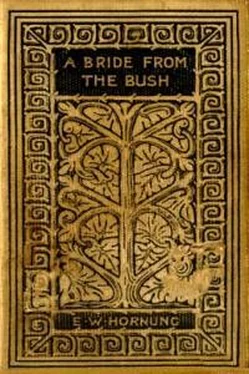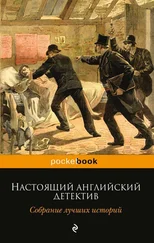"I thought he would never forgive me for giving him that bit of my mind the other day; but you see, Alfred, it did him good; and now I like him better than I ever thought possible in this world. He's awfully good to me. And we take an interest in the same sort of things. Didn't you hear how interested he was in Bella's sweetheart at lunch to–day?"
Alfred turned away from the fresh bright face that was raised to his. He could not repress a frown.
"I do wish you wouldn't call the girl Bella," he said, with some irritation. "Her name's Bunn. Why don't you call her Bunn, dear? And nobody dreams of making talk about their maids' affairs, let alone their maids' young men, at the table. It's not the custom—not in England."
A week ago he would not have remonstrated with her upon so small a matter; but the ice had been broken that morning in Richmond Park. And a week ago she would very likely have told him, laughingly, to hang his English customs; but now she looked both pained and puzzled, as she begged him to explain to her the harm in what she had said.
"Harm?" said Alfred, more tenderly. "Well, there was no real harm in it—that's the wrong word altogether—especially as we were by ourselves, without guests. Still, you know, the mother doesn't want to hear all about her servants' family affairs, and what her servants' sweethearts are doing in Australia, or anywhere else. All that—particularly when you talk of the woman by her Christian name—sounds very much—why, it sounds almost as though you made a personal friend of the girl, Gladdie!"
Gladys opened wide her lovely eyes. "Why, so I do!"
Alfred looked uncomfortable.
"So I do!" said the Bride again. "And why not, pray? There, you see, you know of no reason why I shouldn't be friends with her, you goose! But I won't speak of her any more as Bella, if you don't like—except to her face. I shall call her what I please to her face, sir! But, indeed, I wouldn't have spoken about her at all to–day, only I was interested to know her young man was out there; and Gran seemed as interested as me, for he went on asking questions—"
Alfred was quite himself again.
"Any way, darling," he said, interrupting her with a kiss, "I am glad you have got over your prejudice against Gran!"—and he went out, looking it; but leaving behind him less of gladness than he carried away.
The conversation had taken place in the little morning–room in the front of the house, which faced the west; and the strong afternoon sunshine, striking down through the trembling tree–tops, dappled the Bride's face with lights and shadows. It was not, at the moment, a very happy face. All the reckless, radiant, aggressive independence of two or three weeks ago was gone out of it. The bold, direct glance was somewhat less bold. The dark, lustrous, lovely eyes were become strangely wistful. Gladys was in trouble.
It had crept upon her by slow degrees. Shade by shade the fatal truth had dawned even upon her—the fatal disparity between herself and her new relatives. This was plainer to no one now than to the Bride herself; and to her the disparity meant despair—it was so wide—and it grew wider day by day, as her realisation of it became complete. Well, she had made friends with Granville: but that was all. The Judge had been distant and ceremonious from the first: he was distant and ceremonious still. He had never again unbent so much as at that tragic moment when he bade her rise from her knees in the wet stable–yard. As for Lady Bligh, she had begun by being kind enough; but her kindness had run to silent sadness. She seemed full of regrets. Gladys was as far from her as ever. And Gladys knew the reasons for all this—some of them. She saw, now, the most conspicuous among her own shortcomings; and against those that she did see (Heaven knows) she struggled strenuously. But there were many she could not see, yet; she felt this, vaguely; and it was this that filled her with despair.
It was green grass that she gazed out upon from the morning–room window, as the trouble deepened in her eyes; and in Australia she had seldom seen grass that was green. But just then she would have given all the meadows of England for one strip of dry saltbush plain, with the sun dropping down behind the far–away line of sombre, low–sized scrub, and the sand–hills flushing in the blood–red light, and the cool evening wind coming up from the south. The picture was very real to her—as real, for the moment, as this shaven grass–plot, and the line of tall trees that shadowed it, with their trunks indistinguishable, in this light, against the old brick wall. Then she sighed, and the vision vanished—and she thought of Alfred.
"He can't go on loving me always, unless I improve," she said dismally. "I must get more like his own people, and get on better with them, and all that. I must ! Yet he doesn't tell me how to set to work; and it's hard to find out for oneself. I am trying; but it's very hard. If only somebody would show me how! For, unless I find out, he can't care about me much longer—I see it—he can't!"
Yet it seemed that he did.
If attending to the most extravagant wish most lightly spoken counts for anything, Alfred could certainly care for his wife still, and did care for her very dearly indeed. And that wish that Gladys had expressed while walking through the village of Ham—the desire to drive about in a coach–and–four—had been at least lightly uttered, and had never since crossed her mind, very possibly. Nevertheless, one day in the second week of June the coach–and–four turned up—spick and span, and startling and fairylike as Cinderella's famous vehicle. It was Alfred's surprise; he had got the coach for the rest of the season; and when he saw that his wife could find no words to thank him—but could only gaze at him in silence, with her lovely eyes grown soft and melting, and his hand pressed in hers—then, most likely, the honest fellow experienced a purer joy than he had ever known in all his life before. Nor did the surprise end there. By collusion with Lady Bligh and Granville, a strong party had been secretly convened for Ascot the very next day; and a charming dress, which Gladys had never ordered, came down from her dressmaker in Conduit Street that evening—when Alfred confessed, and was hugged. And thus, just as she was getting low and miserable and self–conscious, Gladys was carried off her feet and whirled without warning into a state of immense excitement.
Perhaps she could not have expressed her gratitude more eloquently than she did but a minute before they all drove off in the glorious June morning; when, getting her husband to herself for one moment, she flung her arms about his neck and whispered tenderly:—
"I'm going to be as good as gold all day—it's the least I can do, darling!"
And she was no worse than her word. The racing interested her vastly—she won a couple of sweepstakes too, by the way—yet all day she curbed her wild excitement with complete success. Only her dark eyes sparkled so that people declared they had never seen a woman so handsome, and in appearance so animated, who proved to have so little—so appallingly little—to say for herself. And it was Gladys herself who drove them all home again, handling the ribbons as no other woman handled them that season, and cracking her whip as very few men could crack one, so that it was heard for half a mile through the clear evening air, while for half that distance people twisted their necks and strained their eyes to see the last of the dark, bewitching, dashing driver who threaded her way with such nerve and skill through the moving maze of wheels and horseflesh that choked the country roads.
And, with it all, she kept her promise to the letter. And her husband was no less delighted than proud. And only her brother–in–law felt aggrieved.
Читать дальше












